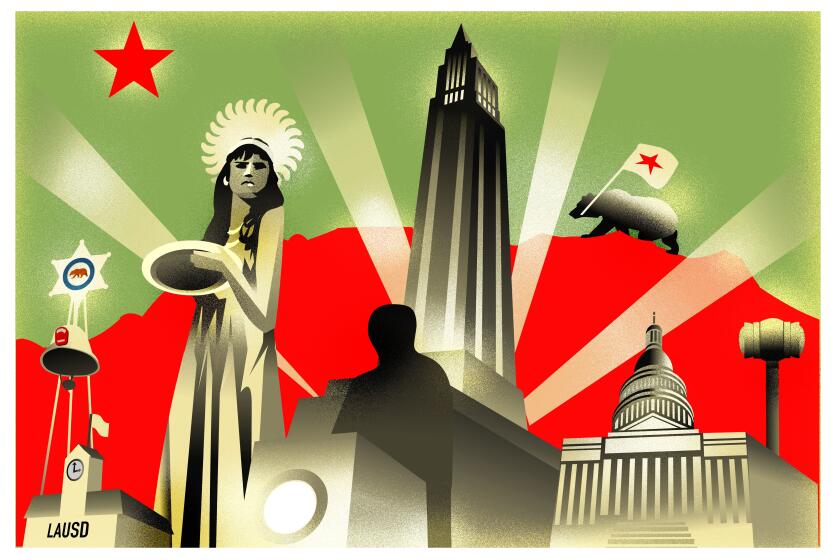How my Korean immigrant parents taught me to pursue my own version of the American dream

- Share via
When I was very young, my parents worked as night janitors at a law firm in Los Angeles. They often took me to work because they couldn’t afford childcare, and to keep my grumpiness at bay they zoomed me around in empty wastebaskets as if they were race cars and made up funny stories about the people who inhabited the offices by day. I remember falling asleep on my father’s jacket in the hallways while they mopped, vacuumed and dusted.
Those were difficult years for them and we had very little, but I was happy. We had a small TV on which I watched cartoons, and on weekends we drove along Pacific Coast Highway, marveling at the vast ocean. And though we lived in a tiny apartment in a cramped building in Koreatown with other immigrant families and the occasional cockroach, I had everything I needed.
When my brother was born a few years later, my dad secured a job as a machinist, making metal parts for cars, boats and airplanes. We moved into a small house in a working-class neighborhood in Norwalk.
As I started befriending the kids on the block, I became aware that our house looked like the others from the outside, but the inside couldn’t have been more different. We had very few possessions. In comparison, my friends lived in splendor. Exotic objects I’d only seen on TV filled their homes: cake stands on the dining table, Atari consoles in the den, Slip ’n Slides in the backyard.
When winter arrived, I was introduced to Santa — a figure completely foreign to my parents, who’d grown up in the countryside of South Korea. My friends bragged about all the bounty they expected from this overweight old man with a white beard (though they all knew his true identity), and so I ran home to tell my parents exactly what they needed to do: Go shopping to buy surprise gifts for me and my baby brother and place them under a Christmas tree while we slept.
Christmas morning arrived, and my parents had done exactly as I’d instructed. Gifts sat under our plastic Christmas tree. Except I’d neglected to mention several key details, so the gifts weren’t wrapped and they still bore their price tags. At 6 years old, I considered myself the family expert on American life, so I lectured my parents on how to improve their Santa game for the next year.
I also taught them how to organize my party for my 7th birthday so it would be just like the ones my friends had. I instructed them to buy a cake with frosting and candles, buy me a fancy dress with a bow in the back, and — most importantly — call my friends’ parents to inform them about the event. They did exactly as I said, except they hadn’t mentioned to anyone that it was my birthday party, so the kids arrived with no gifts, wearing nothing special.
I spent the entire party sulking. When our guests left, my mom gently explained that requiring people to bring gifts would be greedy and inelegant. The presence of our friends was enough of a gift. That night, she prepared a traditional Korean birthday meal for me — rice with seaweed soup and side dishes. For dessert, we had tangerines.
I remember crying myself to sleep. Would we ever be American?
Los Angeles Times editorial board endorsements for the U.S. House, California ballot measures and more.
As a child, I thought being American meant to go shopping, to fill our home with objects of desire to show off to visitors. This was the clear message I received from TV and magazines, and even most grown-ups seemed to have adopted this as the shining truth, dreaming of fancier cars and bigger homes.
As I grew older, I promised myself that I would make up for the years of deprivation. Memories of my parents’ toil defined my life, propelling me to attend Yale University and eventually become a corporate lawyer. I treated my parents to vacations and chipped away at their mortgage.
I was also finally able to pursue what I thought defined the American Dream for those around me: a life of stability and comfort in a beautiful home full of gleaming objects. I believed that Treat Yo’self was synonymous with the American Dream, and so I spent one of my first paychecks on a Cartier watch, which set the tone for years of shopping.
But as the decades passed and a sense of dissatisfaction lingered, I came to realize that I was living someone else’s dream, shaped by advertisements and social pressures to be like everybody else. No object I could buy would ever satisfy my hunger for wonder and meaning. The pursuit of unneeded possessions had helped bury my truest, deepest desire: I had always wanted to be a writer. I loved stories for their ability to transport me into different lives, different worlds. I had sporadically tried to establish myself as a children’s book author, but the constant rejections wore me down. A trip to the mall always made me feel better. Temporarily.
Then one night about five years ago, I was driving down Wilshire Boulevard and the past suddenly burned bright, bringing to the fore the lesson my parents taught me on those long, late nights when they cleaned offices: No matter who you are or what your background, with hard work and imagination, you just may attain your truest and deepest dream. I recognized my American dream was to write books that could make a reader’s imagination soar, as mine did on those long-ago evenings with my parents.
Helena Ku Rhee’s children’s book, “The Paper Kingdom,” is based on her childhood when her parents worked as night janitors.
More to Read
A cure for the common opinion
Get thought-provoking perspectives with our weekly newsletter.
You may occasionally receive promotional content from the Los Angeles Times.










